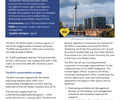Library
- All
- Biel Crystal, Huizhou
- C&F Manufacturing, Dasmariñas
- Cal-Comp, Mahachai
- Cal-Comp, Petchaburi
- Compal, Kunshan
- Dell India, Sriperumbudur
- Dell, Łódź
- Delta Electronics
- Delta, Dongguan
- Dongguan
- Epson, Bekasi
- Foxconn, Kutna Hora
- Foxconn, Pardubice
- Foxlink, Donguan
- Goertek, Bac Ninh
- Hongtai Glass, Dongguan
- Inventec, Chongqing
- JCY, Johor Bahru
- Jabil, Guangzhou
- Jabil, Pulau Pinang
- KTC, Shenzhen
- Kobe, Pulau Pinang
- LCFC, Hefei
- PT. Longvin, Sukabumi
- Possehl Electronics, Melaka
- Qisda Optronic Co. Ltd, Suzhou
- Quanta, Shanghai
- SMT, Laguna
- Salcomp, Sriperumbudur
- Samsung Electro-Mechanics Philippines Corporation (SEMPHIL), Calamba City
- Western Digital, Petaling Jaya
- Wistron, Zhongshan
- Yiking Plastic, Phetchaburi
- All
- Child labour
- Covid-19
- Debt bondage
- Environment
- Forced labour
- Freedom of association
- Gender
- Indigenous rights
- Industry engagement
- Just transition
- Land disputes
- Low emission vehicles
- Migrant workers
- Migrant workers
- Minerals
- Monitoring methodology
- Occupational health & safety
- Precarious work
- Remedy
- Stakeholder engagement
- Student labour
- Suicide
- Transparency
- Violence & harassment
- Wages
- Working hours
-
IT Dienstleistungszentrum, ITDZ Berlin
July 2025
Read moreThis time the spotlight's on one of our German affiliates, IT Dienstleistungszentrum (ITDZ Berlin), the central ICT provider for Berlin. Annelie Evermann, Legal Sustainability Manager, describes their responsible procurement journey, the importance of contract management and dialogue, and going beyond the visible range of monitored tiers and consumer products.
-
-
Case study: Sustainable tendering of e-buses at BVG
June 2025
Read moreThis case study examines how Berliner Verkehrsbetriebe’s (BVG) procurement of articulated e-buses strengthens human rights due diligence (HRDD) standards in the bus market in Europe. Bus suppliers are open to a dialogue-oriented process and to deliver bids on demanding sustainability requirements.
Available in:
English | Français | Español | Deutsch | Nederlandse
-
Debt bondage remedied through joint action
May 2025
Read moreIn October 2022, a Nepali migrant worker at Allied Precision Technologies in Melaka, Malaysia was abducted by company representatives and deported for complaining about recruitment abuses. Our latest Impact Story explores how pressure from affiliates, human rights activists and linked brands eventually led to remedy for affected workers. Also available in:
-
Realising remedy: a key component of corporate due diligence
May 2025
Read moreRemedy is an essential but often overlooked element of corporate due diligence. To tackle this gap, Electronics Watch and the GIZ Initiative for Global Solidarity (IGS) collaborated between 2022 to 2024 to improve workers' access to an effective grievance mechanism in electronics supply chains. This publication reflects on the lessons learned.
-
Reseller-public buyer dialogue summary
March 2025
Read moreThis document provides a summary of the reseller/public buyer meeting held on 10 February 2025. Participants discussed how to better link the social requirements in tenders and contract performance to improve coherence and incentivise effective human rights due diligence.
-
-
-
-
-
-
-
-
Procurement best practice
February 2025
Read moreWhat does 'good' look like? This infographic shows procurement best practices, including pre-tender, tender and contract management.
© 2024 Electronics Watch, all rights reserved
-
-
-
The complexity of the ICT supply chain
February 2025
Read moreICT hardware products contain many components and sub-components, manufactured by different companies in different parts of the world. This infographic shows how complex the ICT supply chain can be, from the extraction of raw materials through to procurement contracts.
© 2024 Electronics Watch, all rights reserved
-
-
-
Forms of forced labour
February 2025
Read moreThis infographic shows different types of forced labour, which include forced student labour, restrictions on the right to resign, forced overtime, debt bondage, deceit, and restriction of movement.
© 2024 Electronics Watch, all rights reserved
-
-
-
High risk supply chains
February 2025
Read moreInfographic showing high risk supply chains, including electronics, mining, food, construction and textiles, and migrant workers.
© 2024 Electronics Watch, all rights reserved
-
-
-
Common human rights risks in electronics production
February 2025
Read moreInfographic showing common human rights risks in electronics production. Also available in:
© 2024 Electronics Watch, all rights reserved
-
-
Mandatory Human Rights Due Diligence: An Opportunity for Workers or Big Business?
November 2024
Read moreThese reflections, by Electronics Watch Executive Director Björn Claeson, seek to contribute to a stronger movement to worker-centred human rights due diligence.
How can we make sure the new generation of human rights due diligence regulations result in positive outcomes for workers in global supply chains? One step is to scrutinise the new Environmental, Social and Governance service industry that has grown quickly to satisfy regulatory requirements. It promises quick and easy solutions based on big data. But workers are marginalised in these solutions.
-
-
Mining Monitoring Guidance
September 2024
Read moreElectronics Watch monitors mines where tin, cobalt, nickel and lithium are extracted in Bolivia, Democratic Republic of Congo, Indonesia and the Philippines. This guidance applies the guiding principles of our Worker-Driven Monitoring Methodology to the specifics of mining, including the work environment and key safety features, and addresses challenges facing monitoring partners in these locations.
-
Impact story: Can tragedy spur improvement in working conditions?
August 2024
Read moreIn August 2023, Xu Xiao, a 23-year-old migrant worker, was found dead in his dormitory at the Qisda Optronic factory in Suzhou, China. Although his death was not officially classified as work-related, he had worked excessive overtime and consecutive night shifts shortly before his passing. This incident has raised critical questions about working conditions in the electronics industry. Our Impact Story explores what measures have been taken since then, and what challenges still lie ahead.
-
City of Copenhagen
July 2024
Read moreGet to know our affiliate, the City of Copenhagen, and their approach to responsible procurement. They talk about following up labour clauses, national and international site visits, aspirations to support workers to organise and include trade unions in remedy, and more!
-
Electronics Watch Annual Accounts 2023 with auditors report
June 2024
Read moreElectronics Watch Annual Accounts 2023.
-
-
Flemish Agency for Facility Operations
May 2024
Read moreWe talk to three team members at the Flemish Agency for Facility Operations (Het Facilitair Bedrijf) in the latest installment in our "Meet our Affiliates" series. Find out more about their socially responsible public procurement goals, how affiliation to Electronics Watch is helping to meet those goals, as well as looking as some of their challenges and achievements along the way.
-
-
-
-
Periféria Policy and Research Center
March 2024
Read moreLearn more about the work of Electronics Watch monitoring partners in production regions, and how they support workers in attaining their rights. In this first interview in a new series, we talk to Linda Szabó, co-founder of Periféria Policy and Research Center in Hungary.
-
-
-
-
-
-
Electronics Watch Annual Accounts 2020 with audit report
December 2023
Read moreElectronics Watch Annual Accounts 2020 with auditors' report
-
Catalan Association of Municipalities (ACM)
November 2023
Read moreElectronics Watch is launching a new series called "Meet our Affiliates". The series will showcase some of our 1,500 affiliates and shine a light on the key people implementing responsible procurement within them. Today we publish the first of these profiles.
-
Impact Story: Victory for trade union rights in Czechia
November 2023
Read moreAt the start of the Covid pandemic workers were concerned for their safety, being in close proximity on the production line. Foxconn, which then employed 1,900 workers in Kutná Hora, Czechia, continued to receive orders. In April 2020, with demand increasing, workers were offered financial incentives to come to work during their Easter holidays. Many Electronics Watch affiliates buy HPE servers made in this factory.
-
-
-
-
-
-
-
-
-
Human Rights and Environmental Impact of Nickel Mining in the Philippines
May 2022
Read moreThe Island of Palawan is home to the largest nickel mines in the Philippines. Mining and related processing have taken place since the 1970's in this region. The village of Rio Tuba is in the Municipality of Bataraza, Province of Palawan. The Rio Tuba Nickel Mining Corporation (RTNMC) started open pit mining in 1975. It is currently the largest producer of lateritic nickel ore2 in the Philippines. Sumitomo Metal Mining Co. Ltd.
-
-
-
Impact Story: Courageous Migrants Self-organise to Get Out of Forced Labour
November 2021
Read moreFor years, a group of migrants who worked at Possehl Electronics in Malaysia, a manufacturer of parts for semiconductors, tried to get appropriate remediation for being forced into illegal and unsafe work...
-
Impact Story: IT workers no longer paying to get a job
September 2021
Read moreAfter a three-year investigation that led to the largest ever IT supply-chain settlement for migrant workers – more companies are paying people back – and faster.
-
-
-
-
-
-
-
-
-
-
-
-
Electronics Watch Monitoring Methodology Guidance
June 2020
Read moreBased on extensive consultations with monitoring and auditing experts, this Guidance standardizes and explains the Electronics Watch worker-driven monitoring methodology step by step. It includes separate chapters on preparing for monitoring, selecting appropriate methods, and obtaining and analysing evidence.
-
When Compliance is Not Enough - Why victims of forced labour should be partners in the remediation design
April 2020
Read moreThis publication shows just why it is essential that workers are involved in the process of remediation, and raises a fundamental question about the limits of responsible business conduct: When companies address violations in their supply chains in accordance with their codes of conduct, but workers still suffer serious harm, does human rights due diligence require the companies to do more?
-
-
-
-
-


















































